Mastering Double Deck Blackjack: Key Strategies Revealed


Intro
Double Deck Blackjack holds a special place in the hearts of gambling enthusiasts, merging the thrill of traditional blackjack with an enticing twist. In this variant, the use of two decks rather than a single deck creates a dynamic environment filled with unique strategic possibilities. Casual players and seasoned gamblers alike can benefit from understanding the nuances that make this game a fascinating choice in casinos worldwide.
The objective remains straightforward: achieve a hand total closer to 21 than the dealer’s, without exceeding it. However, the strategy behind navigating the game becomes increasingly intricate due to the reduced number of decks, which alters probabilities and betting strategies. This article will take a deep dive into the gameplay mechanics, betting strategies, and practical tips that can enhance one’s proficiency in this exhilarating variant of blackjack.
As we progress, readers will find valuable insights on the implications of using two decks, including how it affects card counting and betting tactics. The aim here isn’t just to teach you how to play but to equip you with advanced strategies that will stand you in good stead at the tables, whether you're a newbie or a wily veteran.
Strategy in Double Deck Blackjack isn't just about luck; it's about making informed decisions based on statistical advantages embedded within the game’s structure. With each hand, a player enters a tug-of-war against the dealer, and knowing how to approach this battle with a solid strategy could be the difference between walking away with a profit or a loss.
So, buckle up as we commence this exploration of this compelling game!
Prologue to Double Deck Blackjack
Understanding Double Deck Blackjack is crucial for both casual and seasoned players. This variant of classic blackjack brings unique dynamics that can significantly influence your experience and strategy. In this section, we will explore the specifics of Double Deck Blackjack, its significance in the broader realm of card games, and what sets it apart from other variants.
Definition and Overview
Double Deck Blackjack refers to a game of blackjack played with two decks of cards, differing from the more common single or multi-deck versions. Each deck provides a balance between the predictability of card counts in a single deck game and the randomness introduced by a multi-deck setup. As you already know, blackjack involves players aiming to beat the dealer by reaching a card total of 21 or as close to it without going over. In Double Deck Blackjack, players need to consider the reduced number of total cards, which can slightly enhance the odds for players familiar with strategies like card counting.
Players must grasp the basic rules to navigate this variant effectively. Each player is initially dealt two cards, and they have various options such as hitting, standing, doubling down, or splitting pairs. Notably, knowing the specific rules governing how to play, including whether the dealer stands on a soft 17, profoundly influences strategic decisions.
Historical Context and Evolution
The roots of blackjack can be traced back to French casinos around the 1700s. The original game known as
Rules and Gameplay Mechanics
Understanding the rules and gameplay mechanics of Double Deck Blackjack is central to mastering this card game. While the basic premise resembles traditional blackjack, the unique characteristics of the double deck variant introduce distinct strategies and play styles. This section aims to dissect the fundamental rules, highlighting why they matter to both newcomers and seasoned players.
Basic Rules of Double Deck Blackjack
Double Deck Blackjack operates under a few foundational rules that distinguish it from its single and multi-deck counterparts. In this variant, two decks of 52 cards are used, increasing the complexity of gameplay and strategy.
Players aims to accumulate a hand total of 21 or as close as possible without going over. Here’s a clearer layout for the basic rules:
- Each player and the dealer are dealt two cards; the dealer typically shows one card face up.
- Players can choose to hit (take another card), stand (keep their current hand), double down (double the bet and receive one more card), or split pairs (separate two cards of the same value into separate hands).
- A natural blackjack—a hand containing an Ace and a 10-value card—pays 3 to 2 while other winning hands pay 1 to 1.
- If the dealer busts, players with hands that are not busts win their bets.
Knowing these rules equips players with a solid foundation to make informed decisions during gameplay.
Differences from Single Deck and Multi-Deck Variants
The environment in which players find themselves often dictates their strategies, and the use of two decks in Double Deck Blackjack creates pivotal differences compared to single or multi-deck games. Firstly, the odds shift considerably due to card availability.
- Card Availability: With two decks, certain cards become less likely to appear, altering how players might calculate their chances. For example, if you know that several tens have already been played, the likelihood of drawing another diminishes.
- House Edge: Generally, the house edge in Double Deck Blackjack is lower than in multi-deck games. However, it can be higher than in single deck variants, especially if the dealer hits on a soft 17.
- Optimal Strategy Adjustments: Strategies that work well for single deck games may not apply as effectively in double-deck variations. For instance, the increased number of cards can prompt players to be more cautious about doubling down or splitting.
These differences mark a crucial area for strategic adjustment. Players must adapt their approach by considering how many decks are in play.
Understanding Card Values and Betting Options
In Double Deck Blackjack, understanding card values is crucial for developing an effective strategy. Similar to traditional blackjack, cards hold specific values: Aces can count as 1 or 11, face cards are worth 10, and numbered cards hold their face value. This straightforwad aspect is foundational but can lead to complex decisions based on player situation and dealer’s visible card.
In addition, betting options are dynamic and offer players flexibility to adjust their strategies:
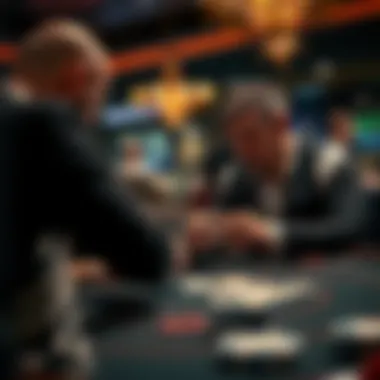
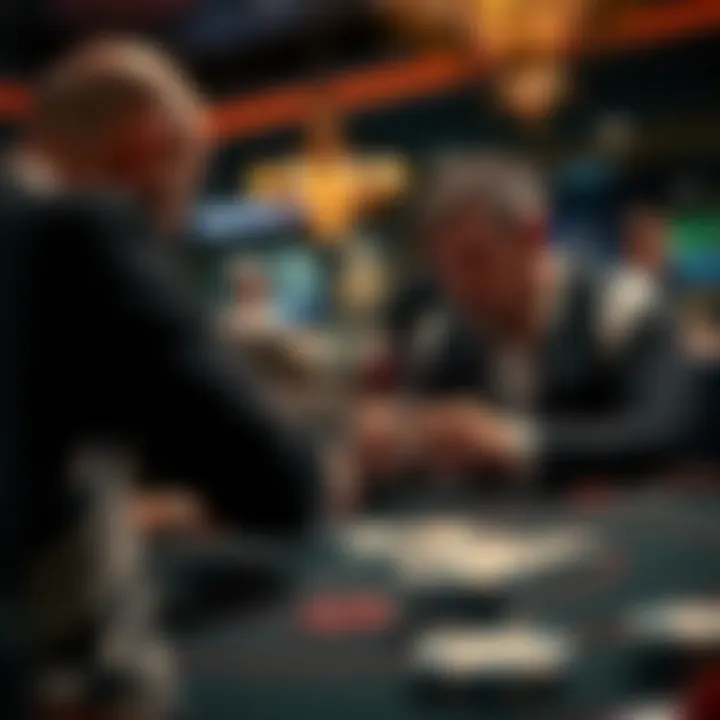
- Basic Bet: The standard betting method where players place ante before cards are dealt.
- Double Down: This allows players to double their initial wager in exchange for one additional card; timing this strategically can significantly affect the odds.
- Splitting Pairs: This option splits two identical cards into two separate hands. Each hand is played independently, and players can double down after splitting as well.
"Proper understanding of card values coupled with judicious betting options can tilt the odds in a player’s favor."
In summary, mastering these rules and gameplay mechanics is essential for gaining an advantage in Double Deck Blackjack. Each element plays a role in shaping gameplay, influencing both immediate decisions and long-term strategies, allowing players to navigate this thrilling game with greater skill and confidence.
Strategic Approaches to Double Deck Blackjack
In order to navigate the unpredictable waters of Double Deck Blackjack, having a strategic mindset is essential. This aspect is not just about making random decisions; it's about employing calculated methods to enhance your chances. The game is a blend of skill and chance, and strategic nuances can give players an edge in this popular variant. Understanding these strategic approaches can transform an ordinary gaming experience into a more profitable endeavor. As players deep-dive into the strategies, they can better manage their bets and adapt their game based on live dynamics at the table.
Basic Strategy Chart for Double Deck Play
A Basic Strategy Chart is a critical tool for any serious Double Deck Blackjack player. It outlines the best decisions based on the player's hand and the dealer's upcard. Following this chart helps minimize losses over time. The fundamental strategies typically revolve around whether to hit, stand, double down, or split.
- Hit if your total is 8 or less.
- Stand when you have a total of 17 or higher, especially against a dealer’s weak card.
- Double Down on any total of 11 when facing a dealer's card that is 10 or less.
- Split pairs of Aces and Eights; avoid splitting tens.
By consistently applying the chart’s guidance, players can reduce the house edge to as low as around 0.5% in Double Deck Blackjack, which is considerably better compared to other variants.
The Importance of Card Counting
One of the most discussed yet often misunderstood strategies is card counting. This method involves keeping track of the ratio of high to low cards left in the deck. The fundamental idea behind card counting is that a deck stacked with high cards (tens and aces) favors the player, while a deck rich in low cards benefits the dealer. By knowing when the odds swing in favor of the player, one can adjust betting strategies correspondingly.
A common card counting method is the Hi-Lo system, where:
- Assign a value of +1 to cards 2-6,
- 0 to cards 7-9, and
- -1 to 10s and Aces.
"Successful card counting needs practice; it's no magic trick, just a smart approach to gain an edge."
When the count is positive, players should consider increasing their bets. Conversely, when the count is negative, it's wise to bet smaller amounts.
Adjustment Strategies Based on Deck Composition
Understanding the composition of the deck can offer further strategic advantages. As cards are played, the remaining cards get affected, altering the probabilities of getting high or low cards. Smart players modify their strategies significantly based on deck composition.
Players should:
- Track the Running Count: This helps in understanding when to raise or lower your bets. If the remaining cards are high, leverage that to your advantage.
- Adjust Basic Strategy Decisions: In some instances, it's wise to tweak your decisions slightly. For instance, if you know that many tens are left, standing on lower totals might be beneficial.
Adapting your strategy based on the deck composition not only maximizes potential winnings but also allows players to develop a more profound understanding of game dynamics.
In summary, strategic approaches in Double Deck Blackjack encompass a blend of basic strategy adherence, card counting, and adaptable tactics based on the decks at play. By understanding these elements, players can hone their skills and increase their chances of walking away a winner.
Mathematical Perspectives
Understanding the mathematical perspectives in Double Deck Blackjack is essential for grasping the intricacies of the game. Players often rely on strategy and skill; however, the underlying math dictates the rules of engagement, affecting outcomes more than one might initially consider. By delving into odds, probabilities, and expected values, players can sharpen their approaches, making informed decisions that enhance their chances of success. Additionally, comprehending the house edge helps in evaluating where the advantages lie, ultimately shaping the gameplay experience.
Odds and Probabilities in Double Deck Blackjack
In Double Deck Blackjack, knowing the odds and probabilities is like having an ace up your sleeve. The two-deck setup changes the dynamics of the game compared to traditional single-deck play. Generally, each deck contains 52 cards, which means that in total, there are 104 cards in play. This alters the likelihood of drawing certain hands, influencing how one might approach betting and strategy.
For example, the probability of being dealt a blackjack (an Ace combined with a ten-value card) in Double Deck Blackjack is higher than in a single-deck game. However, it is still less favorable than in games with multiple decks because the number of high-value cards fluctuates with each hand played.
To illustrate:
- The chances of achieving a natural blackjack are approximately 4.7% per hand when playing with two decks, quite distinct from the higher odds in single-deck scenarios.
- When considering busting (going over 21), the probability varies. Experienced players should utilize probabilities to assess the risk associated with hitting or standing on specific hands, adjusting their strategies accordingly.
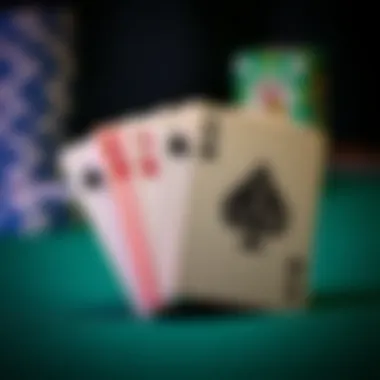

Taking the time to memorize key odds can shape the way players decide whether to hit, stand, double down, or split.
Expected Value Calculations
Expected value calculations, often abbreviated as EV, serve as a critical compass in any gambling endeavor. In Double Deck Blackjack, EV provides players with insights into the expected winnings or losses for each move they make based on the probabilities of potential outcomes.
For instance, if a player has a hand totaling 16 against a dealer's upcard of 10, one might wonder what the best course of action is. By analyzing the expected value based on previous outcomes and future possibilities, players can ascertain the statistically best move.
Calculating EV can involve more complex formulas, but the core principle remains the same:
- If the expected value of hitting is positive, it may be wise to take that risk.
- On the other hand, if the expected value of standing offers better prospects, backing down from aggression might be the best option.
Players must consider a variety of factors, including the dealer's upcard and the remaining cards in play. Understanding this concept translates numbers into actionable strategies.
House Edge in Double Deck Blackjack
The concept of house edge cannot be underestimated in the realm of casino games. In Double Deck Blackjack, the house edge is a measure that reveals the percentage of each bet that the casino expects to keep over time. This edge has implications on player strategies, and knowing it helps in managing bankrolls effectively.
Typically, the house edge for Double Deck Blackjack hovers around 0.4% when optimal strategies are employed. Factors that may influence this edge include:
- Rules Variations: Different casinos may implement distinctive rule sets affecting the house edge. For example, allowing players to double down only on certain hands or limiting splitting can elevate the house advantage.
- Player Strategy: Adhering to basic strategy can significantly lower the house edge. Challenging to track, but beneficial when mastered, players who deviate from basic strategy often find themselves at a disadvantage.
- Deck Composition: As cards are dealt, the composition and value of remaining cards can influence the house edge. Players need to adapt their strategies accordingly, keeping in mind the changing landscape.
Psychological Aspects of Playing
Understanding the psychological dynamics at play in Double Deck Blackjack is crucial for players who wish to improve their game. The mental component can often make or break a player’s success, especially in a game where decisions have significant financial implications. Players must realize that their emotional state, cognitive biases, and behavior patterns directly influence their decisions at the table. Knowing this can better equip gamblers to handle stress, boost confidence, and recognize errors in judgment, enhancing both enjoyment and outcomes.
Understanding Player Behavior and Decisions
In the world of gambling, player behavior is not merely about the choices made at the table, but also about how psychological factors can sway these choices. Understanding why a player hits when they should stand can often be attributed to emotions rather than logic. Polling data from seasoned gamblers shows that many players make decisions based on gut feelings or past experiences rather than a structured strategy. This can lead to choices that deviate from the statistical best practices.
- Emotional Influences: Stress, excitement, and frustration can cloud judgment. Players might chase losses or become overly confident after a win.
- Cognitive Dissonance: When a player’s results don’t align with their expectations or what they believe to be their strategy, it can lead to irrational decisions to justify their past choices.
- Social Constructs: Peer pressure at the table can also play a role. Observing a fellow player taking a risk may lead someone to follow suit, despite it being against their better judgment.
Understanding these behavioral nuances can help players develop a more disciplined approach, relying less on emotions and more on strategy. Research from gambling studies, like those found on reditt.com, highlight how understanding these patterns can lead to better decision-making.
Dealing with Variance in Gambling
Variance—essentially the ups and downs in gambling—is a fact of life for anyone who puts their money on the line. In Double Deck Blackjack, variance can come into play when players experience stretches of both winning and losing hands. Recognizing the presence of variance and learning to navigate its unpredictable nature can be half the battle.
- Expectation vs. Reality: Players need to reconcile their expectations with the reality of variance. Getting a string of bad luck doesn’t mean the strategy is flawed; it’s part of the game.
- Emotional Resilience: Building mental resilience is vital. Accepting that not every hand will go the way one wants helps in maintaining a clear mind, crucial for long-term success.
- Bankroll Management: Creating a solid bankroll management strategy can help mitigate the emotional impact of variance. By only betting what one can afford to lose, players can approach the game with a healthier mindset.
The interplay between psychological factors and variance highlights the vital importance of mental conditioning in gambling. With insights and techniques that focus on emotional stability and rational thought, players may better handle the rigors of the game, leading to sustained success over time.
"In gambling, the only certainty is uncertainty."
Embracing this notion can set the stage for more informed and strategic play, ultimately leading to more rewarding experiences at the blackjack table.
Online Double Deck Blackjack
The realm of online gaming has transformed the way players engage with Double Deck Blackjack. This section digs into why Online Double Deck Blackjack stands out in today’s digital landscape, illustrating both the advantages and the particular factors to keep in mind. In the blink of an eye, players can immerse themselves in thrilling games from the comfort of their own home or on the go, which makes it essential to understand the nuances associated with playing online.
Differences in Online Versus Land-Based Play
When comparing online Double Deck Blackjack to its land-based counterpart, several distinctions emerge, impacting the player experience.
- Game Speed: Online games often proceed at a faster pace. Shuffling and dealing occur in seconds, making it vital for players to adjust their strategies accordingly.
- Environment: Playing in a virtual space lacks the social interaction found in brick-and-mortar establishments. This could affect player psychology, as some players thrive in the lively atmosphere of a casino while others prefer the anonymity online can offer.
- Table Selection and Limits: Online platforms typically boast a wider array of games and betting limits, catering to various player preferences and bankrolls. This can be especially enticing for experienced players looking for high-stakes tables.
- Bonus Offers: Many online casinos offer welcome bonuses and promotions, a perk that physical casinos rarely provide. Accessing these bonuses can significantly enhance a player's bankroll and overall gaming experience.
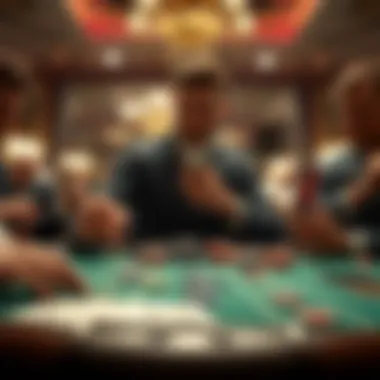
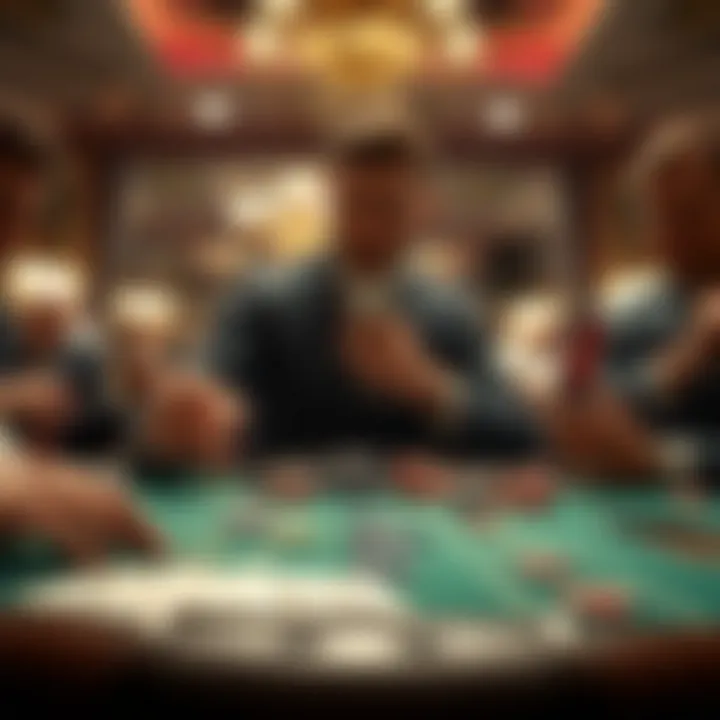
Choosing the Right Online Casino
Picking an online casino can feel like searching for a needle in a haystack given the sheer volume of options available. But some key parameters can guide players towards a wise choice:
- Licensing and Regulation: Ensure the casino is licensed and regulated by a reputable authority. This can provide reassurance about fair play and security. Look for casinos regulated by organizations like the UK Gambling Commission or the Malta Gaming Authority.
- Reputation and Reviews: Research the casino's reputation. Players should look at reviews on forums like Reddit or dedicated gambling sites to gauge user experiences.
- Payment Options: Check the available payment methods and ensure secure, swift transactions. Reliable casinos provide various options including credit cards, e-wallets like PayPal, and even cryptocurrencies in some cases.
- Game Variety: Assess whether the casino offers a solid selection of Double Deck Blackjack along with other games of interest, keeping boredom at bay.
Understanding Casino Software and Game Variants
The software powering online blackjack games greatly influences gameplay and performance. Here are pivotal elements to consider:
- Provider Reputation: The quality of games can vary depending on the software provider. Leading companies like Evolution Gaming and NetEnt often create more immersive and better-performing games than lesser-known providers.
- Compatibility: Check if the games are compatible across devices, whether it's mobile or desktop. Seamless transitions are vital for a good gaming experience.
- Game Variants: Besides standard Double Deck Blackjack, several variants may be available, such as those with different rules or side bets. Understanding these variations can enrich the player's experience and increase the scope for strategy.
As players navigate through the world of online Double Deck Blackjack, these aspects help define their gaming experience. To thrive in this environment, it’s crucial to attune oneself with not only the game mechanics but also with the online platforms that host them.
Advanced Techniques for Experienced Players
When it comes to excelling in Double Deck Blackjack, it's not just about knowing the basics or following the simple strategies. Experienced players often seek out advanced techniques to maximize their chances of winning while managing risks effectively. This section dives into the various strategies that can give seasoned players an edge over their opponents and the house.
Team Play Strategies
Team strategies can transform a gambling session into a well-coordinated effort. The idea behind these strategies is to pool the skills and resources of multiple players working together.
- Roles Within the Team: Each member can assume a specific role, such as a spotter, who keeps track of the count and signals back to the bettor, someone who makes max bets when the count is favorable.
- Information Sharing: Players communicate discreetly using signals or codes. For instance, a player might tap their fingers twice if the count is high, while a single tap indicates a neutral situation. This sort of interaction avoids drawing attention from the dealer or the pit boss.
- Capitalizing on Betting Limits: Team members can place bets in different spots on the table to cover more ground. This can potentially lead to higher winnings when the team effectively utilizes card counting information.
"In Team Play, it's teamwork and timing that can stack the odds in your favor."
Bet Sizing Techniques
Bet sizing is not merely about how much money you throw onto the table; it’s about making your wagers strategically to extract value when opportunities arise. Here are several elements to consider:
- Proportional Betting: Adjust your bet based on your current bankroll and the perceived strength of your hand. For instance, if you're confident due to a favorable count, consider increasing your bet size. Conversely, pull back when the odds shift against you.
- Variable Bets: Instead of sticking to the same bet size, vary it to confuse the casino's surveillance. If you frequently change your bets—going high on a good hand and dropping back when the odds aren't in your favor—it makes it harder for them to pick up on your strategies.
- Declining Bets Method: In a losing streak, reduce your bets to conserve your bankroll. Once you start winning again, increase accordingly. This method can help maintain your edge during rough patches.
Playing for High Stakes
Playing for high stakes requires a solid understanding of not just the mathematics of the game, but also the psychology behind going all in. Here are some considerations:
- Risk Management: High-stakes play can sometimes lead to significant loss. It's crucial to establish loss limits before you sit down, ensuring you're not drawn in by adrenaline.
- Professional Mindset: Approach every hand with a cool head and avoid emotional decisions. High stakes can breed anxiety; focusing on your strategy rather than outcomes will yield better results.
- Focus on Deck Composition: In high-stakes games, the composition of the deck can swing dramatically based on a few cards. Quickly assess what’s been played and adjust your strategy as needed.
Engaging in high-stakes gaming means you’ve accepted a level of risk that can be both thrilling and daunting. The key is not to let the stakes drive your decisions but rather play confidently with a clear strategy in mind.
Culmination
In wrapping up our exploration of Double Deck Blackjack, it's crucial to understand the multifaceted nature of this beloved card game. From strategic foundations to psychological influences, Double Deck Blackjack offers a rich tapestry of considerations for players at all levels. This section serves to consolidate our insights and underscore the vital elements that contribute to mastering the game.
Recap of Key Concepts
- Gameplay Dynamics: We've discussed how the use of two decks changes the dynamics compared to single or multi-deck versions. Players need to adapt their strategies to account for the reduced number of cards, impacting the odds and potential outcomes.
- Strategic Approaches: The article elaborated on various strategic techniques, including basic strategy charts and the sometimes crucial practice of card counting. Both approaches underscore the importance of informed decision-making throughout gameplay.
- Mathematical Foundations: The mathematical perspectives shared illuminated the odds associated with different scenarios in Double Deck Blackjack, enabling players to make more informed bets and recognize how to position themselves against the house edge.
- Psychological Factors: Understanding how emotions and psychological aspects can influence player behavior was an essential component. Awareness of variance, or the ups and downs of a gambling session, can help players manage expectations effectively.
- Online Versus Land-Based Play: The differences between online and land-based platforms were significant. Recognizing these can enhance a player's experience and improve their chances of success, depending on their chosen environment.
In summary, by keeping these key concepts in mind, players can navigate the complexities of Double Deck Blackjack with greater confidence. The blend of strategy, mathematics, and psychology can empower players to refine their skills and accumulate informed insights as they play.
Final Thoughts on Mastering Double Deck Blackjack
Mastering Double Deck Blackjack is not merely about understanding the rules and applying strategies; it is about developing an intuitive sense of the game. Enthusiasts should view their journey in this game as a continual learning experience. Here are a few concluding thoughts to consider:
- Practice Makes Perfect: As with any skill, continuous practice solidifies knowledge. Consider utilizing free online resources or playing in low stakes games to hone your skills without the pressure of significant losses.
- Stay Flexible: Each hand presents a new opportunity. Sticking too rigidly to a strategy can hinder adaptability. Learn to pivot your approach based on table dynamics and your own comfort level.
- Mind Your Bankroll: Managing your funds is as crucial as understanding the game. Establish clear limits to mitigate losses and maintain focus on the enjoyment of playing rather than purely the outcome.
- Community Engagement: Engage with other players or forums, like those found on reddit.com or poker-focused sites. Sharing experiences and strategies can yield new insights.
Ultimately, Double Deck Blackjack is a blend of strategy, chance, and psychology, offering a rich adventure for players willing to delve deep into its nuances. As players apply the principles discussed here, they may find themselves not only improving their game but also enjoying it to its fullest. For further reading on the game strategies, you may visit wikipedia.org or check resources like britannica.com, which can provide more foundational knowledge.
"The more you play, the more you learn, and the more you learn, the better you get." - Unknown origin.
As you leave this exploration, remember that every session at the table is a new chapter. Happy playing!



